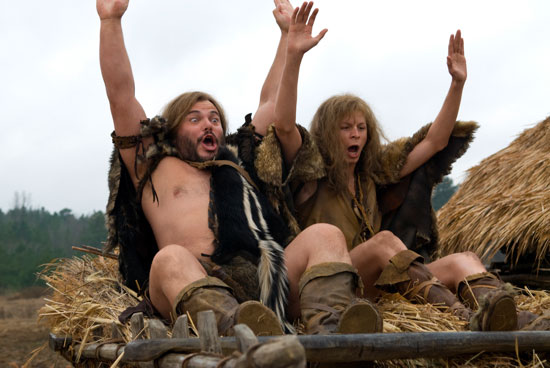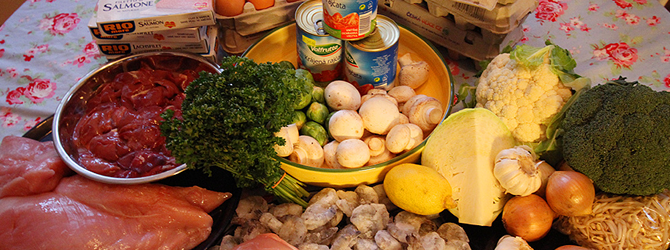I don’t mind growing a beard, walking around barefoot and throwing the odd spear at a wildebeest, but alas I am not a caveman. However it turns out that the way they ate was actually pretty good. Possibly due to the fact they had to pick, dig up or kill their own food, and partly due to the lack of drive-thrus and Indian takeaway.
Their loss…or was it?
Despite hearing that Palaeolithic man had a low life expectancy, they actually lived quite well and for a reasonably long time as long as they survived birthing problems, the cold of winter, being eaten by a sabre tooth tiger or getting lost on a walk and falling off a cliff.
They didn’t have problems sleeping, unless a wolf was lurking around camp. They didn’t have digestion problems like constipation, gas, reflux, etc. They didn’t get constant headaches or migraines, or bad muscle tension issues like so many of us do. These are all things that diet can help reverse.
The digestive system is the centre of the body’s immunity, and when it is compromised, we get sick. Sometimes, we can get really sick and I suspect this is where many cancers are spawned from.
Cancer wasn’t invented when cavemen were around. They were all fit and strong (women and children too) and travelled around to collect food so they were always active. They had fantastic eyesight and all their teeth. It’s amazing what a lack of processed sugar will do for you. And there were other foods they ate little of too.
Can you believe cavemen didn’t eat cereal for breakfast? In fact they quite often didn’t have breakfast. They may have only eaten a meal once or twice a day, with a few berries here and there.
Other foods cavemen ate little or none of were grains, dairy and legumes. Now not all indigenous tribes ate the same. I’ve heard that African tribes often drank fresh milk and blood from their livestock (not that I’m suggesting you try it). The Eskimo ate a diet rich in whale blubber, fish and very little carbohydrates and they seemed to do quite well despite the mildly cool conditions. And other tribesmen or cavemen may have even eaten rice and beans in some quantities.
The main source of nutrition for all Palaeolithic ancestry was meat, fish, fruits and vegetables and fat from animals, nuts, seeds and coconut.
Could we survive or even thrive on a diet similar to the cavemen?
I believe we can.
In August of 2010 I started a metabolic typing diet which had me eating meat and vegetables for breakfast. It was specifically to help me get over Chronic Fatigue and it made an immediate difference.
I had some reservations about eating so much meat as I had read many articles over the years (including ‘The China Study’) and even went vegetarian for a year. I admit I had already given up on most cereals except muesli and porridge, but that was because they didn’t give me any energy.
On my metabolic typing diet there was very little grains allowed. I was only eating sprouted grain bread and some potatoes. I even converted to sweet potato as it is a lower GI source of carbohydrates so it provided longer lasting energy. There was no rice or pasta.
Later that year I can across The Paleo Solution by Robb Wolf which explained to me about why my grains were taken out of my diet. Apparently you need a lot of them to receive a good amount of energy back and they are difficult to digest.
It also talked about gluten intolerances and that many more people than those who have been diagnosed with celiac issues still suffer unknowingly, amd celic isn’t the only problem gluten can cause.
The bottom line was…
…most grains including whole grains were not ideal for the human digestive system.
Sean Croxton shares this great quote from ‘The Dark Side Of Fat Loss’:
‘Over the past 50 years, wheat has been altered considerably by way of hybridization in an effort to increase yield, increase resistance to disease and drought, and end world hunger. While these are all very honourable causes, these man-made changes have also increased the crop’s gluten content, thus making it far more harmful than any wheat that Moses ever consumed.’
Wheat is the biggest culprit so I would suggest taking it out of your diet for a month and seeing if you feel better/different.
Interesting.
I was first exposed to the issues with dairy products by the Spartan Health Regime in 2001. It was the first serious book on true health and fitness that I read and inspired me to become a personal trainer.
Most milk is so processed that it has lost the goodness that was in there in the first place.
It’s heated up and cooled down to kill of some (supposed) nasties, so all we get is a product that lacks the nutrition that came out of the cow. Also humans are the only animal that drinks milk after infancy and the only animal to drink the milk of another animal. Cats and dogs will drink anything so let’s just forget them.
Now we all have the ability to break down lactose, because we needed it as a newborn drinking mother’s milk, but often we lose that ability as we age. Not everyone does, but I suggest if you are going to drink dairy you find the least processed stuff you can find.
 Raw goats milk can be found if you look hard enough, but you can survive without it. I’m sure you can find other raw milks around, but they are likely hard to find.
Raw goats milk can be found if you look hard enough, but you can survive without it. I’m sure you can find other raw milks around, but they are likely hard to find.
I’ve had very little milk since 2001 and my bones aren’t as brittle as Samuel Jackson’s were in Unbreakable. In fact you can get plenty of calcium from green leafy vegetables. But calcium can be leeched from the body by eating processed foods such as sugar.
Legumes are an interesting one too. Legumes contain phytates which the body struggles to break down for digestion and saponins which injure the gut lining. I have leaky gut syndrome and I think my year of vegetarian eating contributed to my gut issues.
I know you’ve heard ‘Beans, beans the musical fruit, the more you eat the more you toot’ and other variations of the same song. And you know that from experience to be true.
Once again from ‘The Dark Side Of Fat Loss’ … ‘removing the phytates from legumes requires extensive preparation, including 12 hours of soaking, 3-4 days of sprouting, and then a period of fermentation. Soaking overnight will only reduce phytates by 8 to 20 percent’.
So if you are going to eat beans, it pays to prepare them properly if you have time, or just don’t eat them at all.
So if you don’t eat dairy, grains and legumes, what do you eat?
I’ll have to save that for another time. I’m still in the middle of preparing a Paleo meal plan and recipes to match, but the basic premise is to combine some protein, vegetables and some healthy fat for a complete meal and to drastically improve your health.
But keep in mind I’m a keeper of the 90% rule, so I still have my treats. No one wants to be that guy at the restaurant creating a meal that isn’t on the menu because he can’t find anything to eat.
In the meantime, ‘The Paleo Summit’ is on between February 26 through March 4 with daily online presentations, and it’s FREE. Go to www.paleosummit.com to sign up and tune in. I’ve listened to many of them already and will no doubt be listening to many more.
If you have any questions, please ask. I’ve been going through this for a long time and the more I look, the more I’m convinced that this is on the right track to long-term health.



1 Response to "The Paleo Diet and Why You Might Try Eating Like A Caveman"
You write that cavemen didn’t have cancer, were strong and fit, but fail to mention that they had a life expectancy of about 35-40 years, for a variety of reasons that our ‘new’ diet has addressed, to now give us a life expectancy of around 80-100 years.